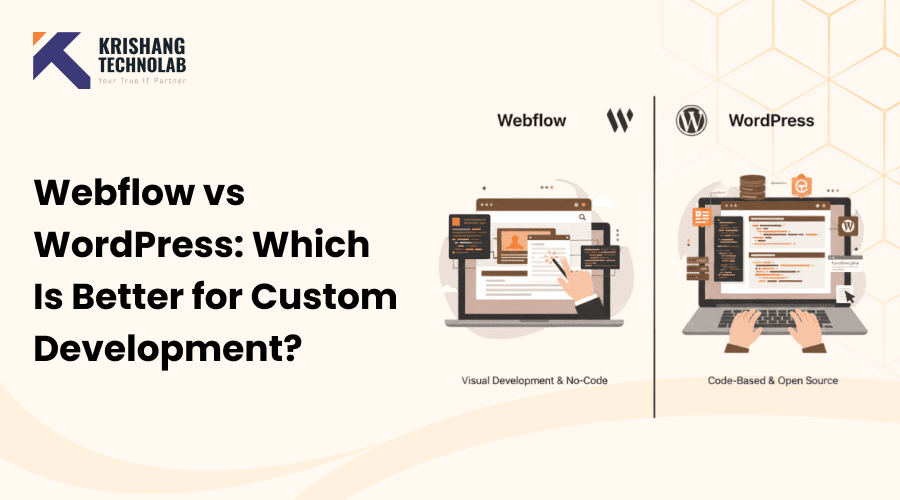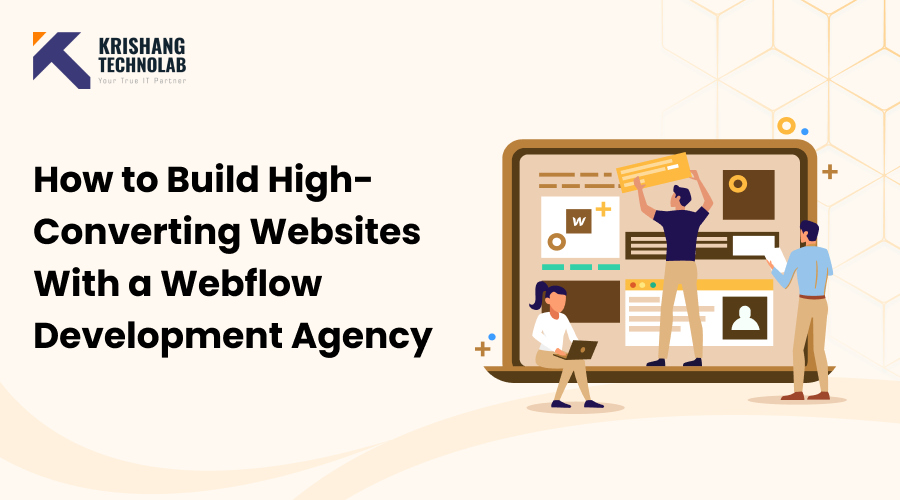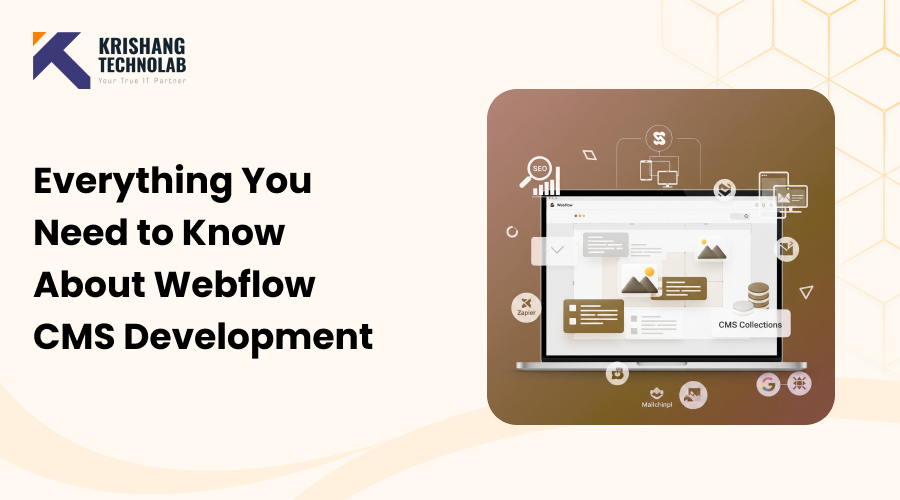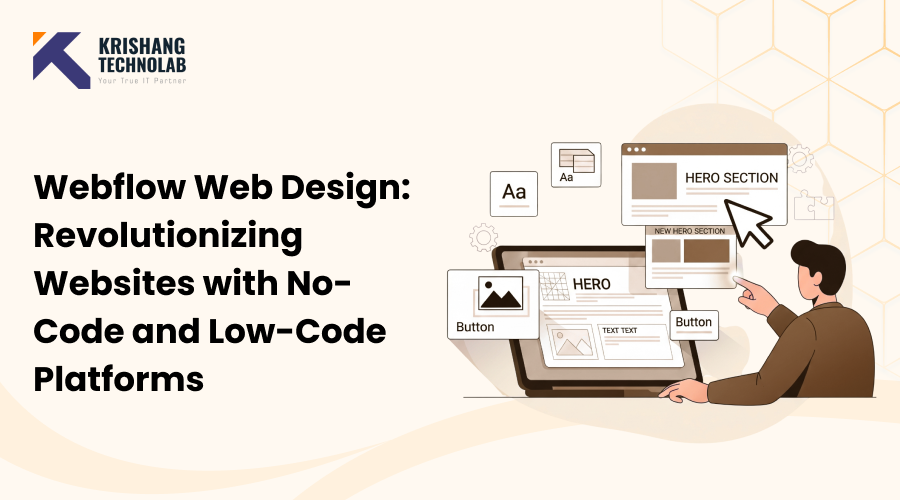Quick Overview: This blog explores Webflow vs WordPress, comparing capabilities, performance, pricing, and customizability to help you determine which platform is best for custom website development for startups, freelancers, and developers looking to create easily updatable and scalable websites and mini-apps that are optimized for SEO.
Selecting the proper platform for building a website is one of the biggest decisions for developers, designers, and small business owners. At the end of the day, when it comes to custom website development, there are two platforms that are commonly referred to: Webflow vs WordPress.
But which platform is good for custom website development if you are a smaller business, startup, or even developing more complex web projects? This blog will dive into the pros and cons of Webflow vs WordPress for developers so you can make an informed decision. Whether you are a startup founder, designer, or developer managing client projects, it’s good to be aware of these differences to save time, cost, and effort.
We will look at everything you need to know about Webflow and WordPress before you sign up for Webflow or buy hosting for WordPress – from usability and hosting forms to customization capabilities.
What Is Webflow and How Does It Work for Custom Development?
Webflow is a visual website building tool that allows designers and developers to build sites without a lot of backend coding. It features a drag-and-drop interface as well as freedom to manipulate HTML, CSS, and JavaScript. As a creator, entrepreneur or team, you can use professional Webflow development services to create websites and have your ideas built as custom solutions when using the Webflow platform.
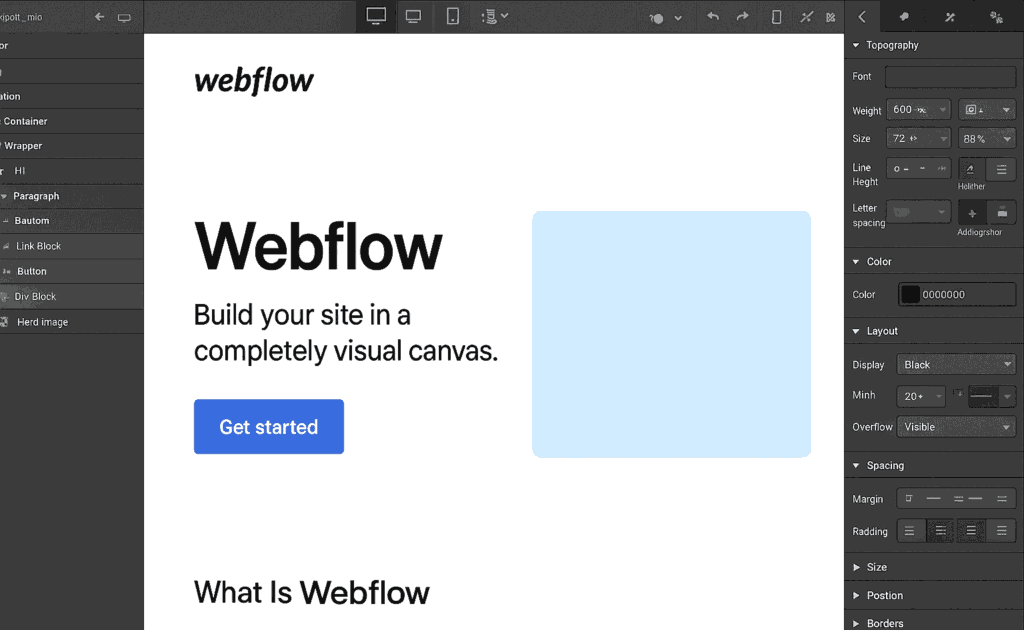
Key features of Webflow include:
Below are some of the key reasons for Webflow’s popularity as a platform for building customized websites:
- Drag-and-drop visual editor for easy prototyping
- Real-time design views to get layouts pixel-perfect
- Integrated CMS for dynamic content
- Included hosting with SSL and global CDN
- E-commerce capabilities for small online shops
Also Read About: Webflow : Creative web design and development platform
Pros of Webflow for developers:
Webflow offers a number of features that provide advantages to developers, ultimately allowing them to work faster, and manage projects more easily:
- Quick setup and deployment
- Great for design-facing projects
- Very little server maintenance
Cons of Webflow for developers:
Regardless of those benefits, Webflow also has many drawbacks developers need to be mindful of:
- Limited backend extensibility
- Minority of third-party integrations compared to WordPress
- More expensive for upgraded plans
To get started with Webflow today, the platform offers templates, tutorials, and hosting as part of the subscription.
What Is WordPress and Why Is It Popular for Custom Development?
WordPress is an open-source content management system (CMS) platform that’s currently being used by more than 40% of all websites in the world. Unlike Webflow, developers can have full access to core files, build custom plugins, and create complex website functions while owning the capability. Many individuals choose to use professional WordPress development services, so they can fully utilize this flexibility and create robust, customized websites.
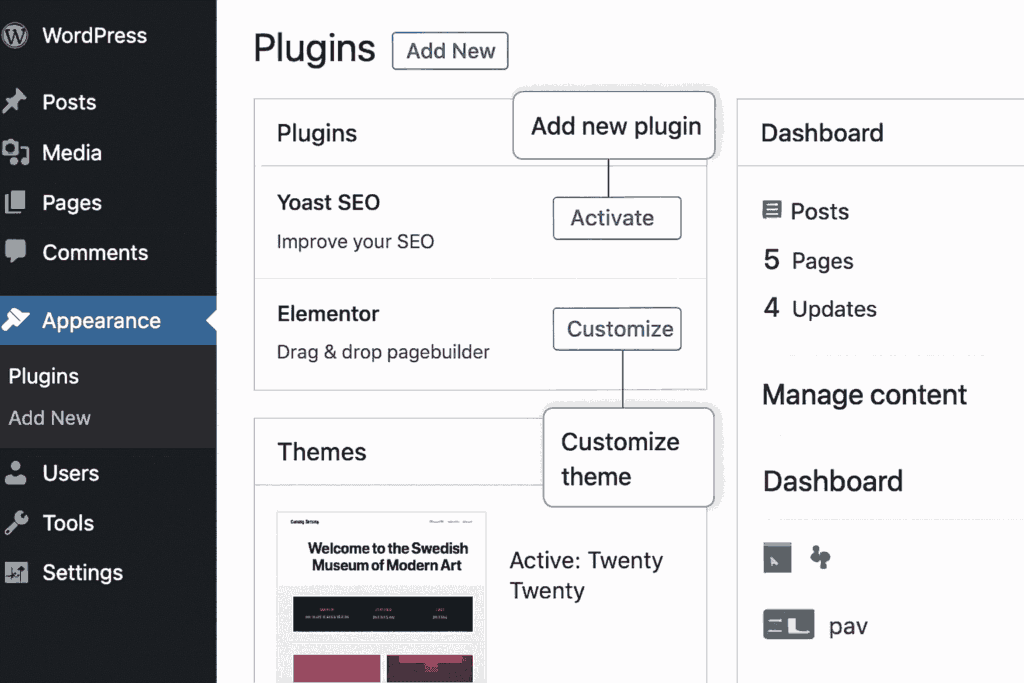
Key features of WordPress:
WordPress has many features, which makes it a great platform for creating anything from small to medium-sized websites:
- Open-source platform, complete code available
- Available plugins to perform every functionality free or paid
- Huge library of themes to implement design fairly quickly
- Large engaged support community with consistent updates
- Can build from a small blog to an enterprise website
Pros of WordPress for developers:
When developers use WordPress to build custom websites, they will appreciate the flexibility and extensive ecosystem WordPress provides:
- Great flexibility and potential for customization
- Can assist with complicated or larger custom projects
- Extensive options of plugins and tools that are third-party
Cons of WordPress for developers:
There are several limitations and responsibilities regarding WordPress that developers should also consider:
- Developers have to set correct hosting and SSL
- You will need to consistently update and maintain
- Security vulnerabilities can happen if you ignore themes and plugins for long periods
Developers can either purchase WordPress hosting and start building immediately or hire a WordPress developer to build features and systems for them.
How Does Webflow Compare to WordPress for Custom Development?
When comparing between Webflow vs WordPress for custom development, you can’t only look at the capabilities that come with each one. When you develop for each platform, you also need to know how they work in real life. Each provider has its benefits and trade-offs, depending upon your project size, budget, and technical skill level.
The table below offers an in-depth comparison of the key metrics of Webflow and WordPress as it relate to usability, customization and features, hosting, SEO, pricing, security, performance, scalability, and others. This will help you easily determine which platform meets your desired approach to web development.
| Feature | Webflow | WordPress |
| Ease of Use | Easy drag-and-drop interface, great for designers or marketers. | Somewhat difficult to use at first. Requires you to manage plugins, themes, and hosting. |
| Customization | No backend access; the frontend is customizable but limited. | You can use complete access to code and open-source flexibility to build things your own way. |
| Hosting | Hosting is included with all plans; SSL and CDN are built-in. | Requires separate hosting; full control over server and environment. |
| SEO Capabilities | Built-in SEO tools (meta tags, sitemaps, clean code). | Advanced SEO plugins (Yoast, Rank Math) for complete optimization. |
| Cost | Subscription-based pricing with hosting included. | Free core; costs vary based on hosting, themes, plugins, and developers. |
| Security | Webflow manages security per your subscription; all sites have SSL by default. | Based on the sites hosting plugin choices, sites don’t update automatically; sites must be monitored. |
| Scalability | Great for small to medium-sized websites. | Can scale with service providers to enterprise websites with capabilities. |
| E-commerce | Built in basic e-commerce functionality but is not flexible like WooCommerce. | WooCommerce plugin with extended e-commerce functionality through third party plugins. |
| Support | Live and active community, and Webflow support is direct. | Large open source community for help; anything acquired through renting the core functionality is subject to the host depending on asking for help. |
| Learning Curve | User-friendly for non-programmers with a visual-first approach. | The learning curve is a little higher if you are a beginner and not familiar with programming. |
Key takeaways:
- Small enterprises, portfolios, or marketing sites that need speed and design attention should use Webflow.
- WordPress is great for projects that are big, complicated, or very unique.
- Before you make a choice, always look at the prices of Webflow and WordPress side by side.
Selecting the right platform is only step one. easily turn your concept into a fully responsive, working website with Krishang Technolab. Get a free quote and let us assist you with expert advice.
Webflow vs WordPress: Website Performance Compared
In regard to the performance of a website, speed isn’t just important for the user experience; it also affects SEO rankings, conversion rates, and overall engagement. A slow website is underperforming and can lose you leads and sales; therefore, developers should carefully consider how the performance of each platform acts.
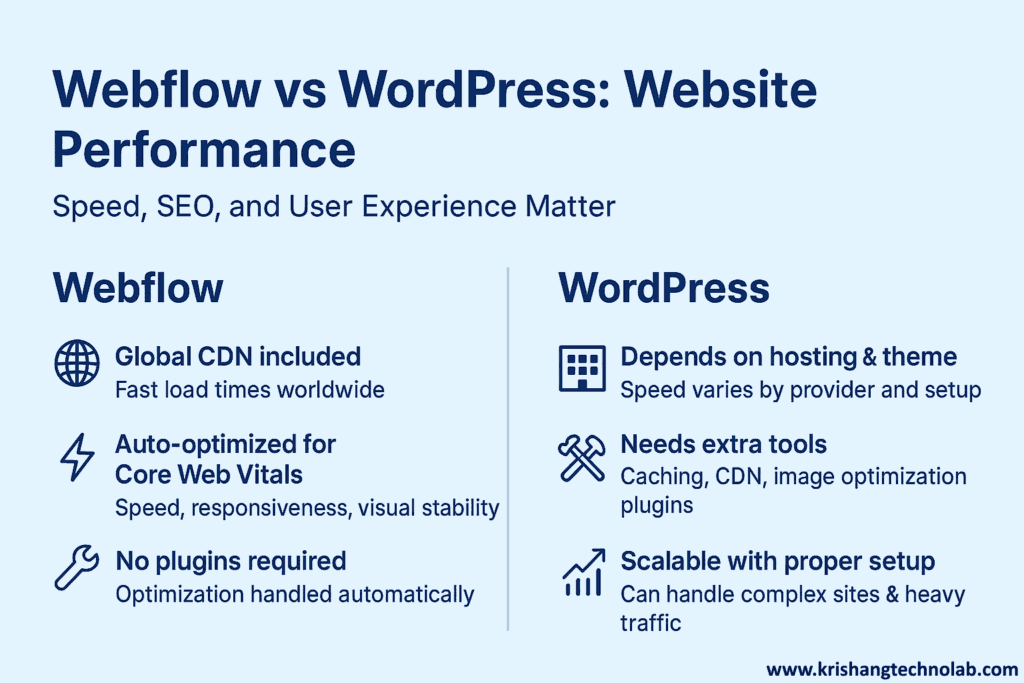
Webflow performance
- Webflow hosting includes a global CDN for free and guarantees fast load times regardless of a visitor’s location.
- All sites are auto-optimized for the Core Web Vitals (which include page speed, responsiveness, and visual stability).
- You won’t need any caching plugins or additional optimization tools; performance is handled completely behind the scenes.
WordPress Performance
- The speed of your WordPress installation is mostly dependent on your hosting provider, the WordPress theme that you are using and any WordPress plugins:
- If you want your WordPress to be fast, you’ll mostly need to add caching plugins (e.g., WP Rocket), CDN services (e.g. Cloudflare) and image optimization tools.
- When all these things are done properly, WordPress can handle massive traffic and complex sites together with all the work from developers.
Comparing Webflow and WordPress Pricing for Your Next Project
Budget is a key consideration in selecting the best platform. While Webflow and WordPress may appear similar in price at first, their pricing models are very different.
Webflow Costs
- They do offer a free plan; however, there are limits to what you can do with it.
- The prices for paid plans are between $14-23/month, depending on what the project is for basic websites.
- For e-commerce, the paid plans can run between $29-212/month, depending on what features you need for the store/website.
- All plans include hosting, SSL, and CDN at the prices mentioned above.
- Templates may be an additional cost ($20-$100+).
Best for users that want a predictable subscription mentality at a moderate to advanced level without the management of the servers.
WordPress Costs
The core software is free, but the following must be paid for:
- Hosting: $5-50+/month (depending on plan provider).
- Domain: ~$10-$15/year.
- Premium themes: final charge for all depends on the user; however, it ranges from $40-100+ for the basic site/build (if the website is using all premium themes).
- Plugins: free to $200+/year (again – depends on how many are needed and other features).
- Developer costs (if taking a customization approach).
All of the aforementioned will culminate into a total monthly cost of between $10 for basic sites and beyond $200 for advanced complete websites.
Webflow vs WordPress: Which Should You Choose for Custom Development?
Choosing between Webflow and WordPress will ultimately be broken down to your goals for your project, your available technical knowledge, and your available budget. Both Webflow and WordPress are good tools to use, however they are both created for very different audiences.
Choose Webflow if:
- You’re a designer or marketer who values no-code freedom
The visual editor of Webflow provides an interface for designing websites much like you would in Figma or Photoshop without worrying about backend code. A platform where you can have total control of the layouts, animations, and styles without a developer. - You want fast deployment and built-in hosting
Webflow makes everything included: hosting, SSL, and CMS. Webflow means you will never have to set up or manage any third-party services or a separate server (for decidedly lower risk). This means you can go to market faster with less moving parts. - You prefer ongoing support and less maintenance
Webflow means no ongoing updates or a litany of endless security checks like WordPress sites to maintain the technical aspects of your site for you. This leaves you focused on design, content, and growth instead of fixing things. - Your project is small to medium in scope
For portfolios, marketing landing pages, or websites for a start-up, or smaller e-commerce stores, Webflow is more than capable of providing enough technical power without complications.
Best fits: Freelancers, agencies, and small businesses that require professional websites that still have a low technical workload.
Choose WordPress if:
- You’re a developer or marketing team that needs full customization
Because WordPress is open-source, you can modify the code, create your own plugins, or create your own business processes to suit your purposes. If your project is complicated and requires complex features, WordPress is the best choice. - You’re building a blog, membership site, or large e-commerce platform
WordPress has great blogging features built in, and it works perfectly with plugins like WooCommerce or MemberPress for online storefronts and subscription services. Webflow’s e-commerce is getting better, but it can’t compete with WordPress’s flexibility in this area. - You want the flexibility of thousands of plugins and integrations
Need advanced SEO tools? CRM integrations? Multilingual support? WordPress has a vast ecosystem of plugins and themes, so you can extend your site in any direction. - You’re planning for long-term scalability
WordPress can grow from a basic blog to a busy business site if you choose the correct hosting company. This makes it a more secure option for larger companies or groups who are scaling.
Best fit: Developers, enterprises, and marketing teams operating complex, scalable websites with rich functionality.
Conclusion: Webflow vs WordPress for Custom Website Development
Deciding between Webflow vs WordPress for custom website development is determined by your goals, technical capacity, and the size of your project. Webflow is best for designer, freelancer, and small businesses who desire a fast deployment no-code platform with hosting built-in and design freedom. On the other hand, WordPress provides unparalleled customization and scalability, making it ideal for developers and large projects requiring complex functionality.
At Krishang Technolab, we help our clients and individuals determine whether to use Webflow or WordPress to build optimized, responsive websites. For startups, hobbyists, and professionals alike, choosing the right platform maximizes efficiency, savings, and long-term success.
FAQs: Choosing Webflow or WordPress for Custom Website Development
Which is better for custom website development: Webflow or WordPress?
It relies on your project and your skills. Webflow is preferred for full custom website development without code. It has a visual editor and allows for quick development. WordPress is preferred for larger, complicated projects where you desire full customization and potential for scalability and advanced plugins.
Can I build a no-code custom website on Webflow?
Yes, Webflow was created for building websites without coding.
- The CMS will manage dynamic content.
- A simple drag and drop visual editor helps you to build any custom layout.
- Add animations and easily control responsive design.
Even first-time users can publish professional websites without code, but will take some practice to apply advanced features properly.
Is Webflow faster than WordPress for website performance?
In general, Webflow sites are faster because the platform is optimized by default.
Reasons why Webflow is fast:
- Clean semantic code is generated automatically
- Global built-in CDN for speedy delivery, worldwide
- No reliance on plugins, which slow down websites
- Automatic image optimization
WordPress speed relying on:
- Hosting provider
- Theme/plugin choices
- Manual optimization using cache and performance plugins
Webflow is usually faster right away, WordPress usually needs extra effort to achieve that speed.
Which platform is cheaper: Webflow or WordPress?
Webflow bases its rates on a subscription and costs about $14/month for a basic site that includes basic hosting and CMS. Rates go up from there if you use eCommerce and other features. WordPress itself is free, but you have to pay for hosting ($3–$30), premium themes, plugins, etc. In terms of cost with multiple sites for complex websites, WordPress can be cheaper in the long run if you can control hosting and plugins. In terms of cost, Webflow likely saves time and money on development due to no-code features, but again, builds with multiple sites and features may add costs. Ultimately, cost depends on complexity of the site, scalability, and hiring developers.
Can beginners create a custom website using Webflow or WordPress?
Webflow is easier to use for beginners usually due to the visual editor and no-code element, while WordPress is a bit more complicated, as understanding plugins, hosting, and themes is a huge learning curve – but WordPress is also capable of much more flexible solutions for developers.
Which website builder is better for SEO: Webflow or WordPress?
Both platforms can support SEO. Webflow has native SEO tools, including meta tags and clean code samples. If you use WordPress, you also have access to sophisticated, advanced SEO plugins like Yoast and Rank Math, which will give you greater control over SEO posts and pages.
Can I migrate a website from WordPress to Webflow?
Yes, migration is done, but it does require some planning. You can either use a tool or manually export-import (move your content), and your WordPress site will become a no-code optimized visual site in Webflow.
Which is better for small businesses: Webflow or WordPress?
Webflow is great for small businesses looking for a fast turnaround, little maintenance, or a clean, professional design. WordPress is great if the business intends to grow, needs advanced functionality over time, or can use some complex integrations.
